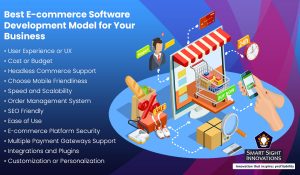Summary – For your e-commerce platform, it is the software that allows your online businesses to manage your website, marketing, sales and other operations. What you want is seamless integration with common business tools, centralized operations and your goals. Your e-commerce software has a sizable impact on the profitability and sustainability of your business. You need to identify your business needs to choose a framework that works, including product listings, online payments, customer experience, data security, etc. What you also need is a collaboration with expert e-commerce software development services that provides the best e-commerce software model for your business.
 With online sales increasing significantly, the only way to go is upwards. An e-commerce site is vital if you are starting a business to capitalize on this explosive online platform. Having the right e-commerce software development services is essential for online retailers to decide their ecommerce marketing strategy. There are many options available — so how do you choose the best from the various options?
With online sales increasing significantly, the only way to go is upwards. An e-commerce site is vital if you are starting a business to capitalize on this explosive online platform. Having the right e-commerce software development services is essential for online retailers to decide their ecommerce marketing strategy. There are many options available — so how do you choose the best from the various options?
-
User Experience or UX
Digital entities like Netflix, Amazon, etc. have an intuitive, friendly and attractive user interface that helps deliver an excellent user experience. Consumers are eager to buy products that look attractive and are presented in the right way and also helps you rule the competition by converting visitors into loyal customers. This is possible by creating a responsive website that offers a seamless experience.
-
Cost or Budget
This is the principal thing to think about while evaluating each e-commerce platform. Comprehend the full expense of every platform, whether you have a physical store that is transitioning online or whether you plan to start a new business over the web.
All platforms have fixed charges and you will bear the handling cost related to every platform. Some solutions such as Magento charge an annual license fee while others such as Shopify require a monthly subscription fee. Determine your needs early to make the process of finding and choosing a solution much easier.
Get the best incentive for your budget by focusing on each angle. Consider how your clients will pay for your products to help you assess costs.
-
Headless Commerce Support
Buyers today seek content and purchases through an array of digital devices from smartphones, tablets, voice, apps and more. This means that your e-commerce platform must match these expectations.
Staying relevant and providing a seamless shopping experience across devices depends on headless commerce that separates the front-end from the back-end. Choose a dynamic UX, as it helps build customer trust and gives your brand a competitive advantage.
-
Choose Mobile Friendliness
With smartphones becoming a necessity, a vast majority of informational queries as well as transactions are performed on such devices. Retailers are looking at a model that provides a mobile-ready experience for their online business.
In the post-pandemic world, online shopping for everything from groceries to electronics is done through smartphones. Make sure your e-commerce design supports a smooth customer experience. The design, navigation and layout of your e-commerce store are important for a hassle-free mobile experience.
-
Speed and Scalability
In the digital age, your platform must provide a fast experience, for the need to see, understand and buy with minimum clicks. As your business grows, a consistent appeal has to follow.
For scalability, you can check slow load times, errors and performance issues. Understand how many customers you can handle on the platform during rush hours. Horizontal and vertical scales and viewing speed are critical to the measurement.
Look for features and functions that meet the needs of your growing business. Factor in advanced caching methods when updating your product or service details.
-
Order Management System
According to studies, online shoppers expect regular updates about their orders and progress. A fast and smooth ordering experience is essential to the e-commerce experience. This means that you must have a system that makes the process interactive and transparent.
Order tracking, email notifications and shipping service APIs are features to watch so you know orders are processed accurately and on schedule to be competitive.
Apart from this, there is a need for uninterrupted communication between your Order Management System (OSM) and Inventory Management System (IMS). This allows shoppers to know when items are available and ready to ship.
-
SEO Friendly
SEO or Search Engine Optimization is one of the most important factors in ensuring the success and ROI of your online store. Organic SEO takes time to build. Best practices help keep up with Google’s algorithms which are always changing.
SEO is important to drive organic traffic. But not all e-commerce platforms are the same when it comes to SEO. Difficulties can be overcome when the platform you choose has the best SEO practices. You must be aware of SEO capabilities.
SEO includes metadata such as tags and descriptions, videos, graphics, images, content, captions and other features in product search results that drive organic traffic and leads.
-
Ease of Use
Ease of Use or Product Management System is the heart of your business. All administrators need is advanced e-commerce product management that is required to create a gripping shopping experience.
It is important to consider the features and functions of the excel file, catalog, product comparison, recently visited, shipping options, and filters like price range, color, size, gender, location, etc.
It helps in assessing your online store operations. A dynamic and responsive online store can bring in more ROI with better system management.
-
E-commerce Platform Security
Site security concerns are fundamental in the computerized age. There are tough worldwide regulations safeguarding consumer interests. Still, a security break can dent your client’s trust.
Your security must be future-proof. Check the security credentials of your e-commerce platform while dealing with sensitive information. You get implicit security choices like cyber-attacks and online fraud observations.
Choose a software solution provider that is focused on data security. Ensure the model you select conforms to the guidelines of the Payment Card Industry. It guarantees the handling or transmission of credit or debit card data.
-
Multiple Payment Gateways Support
It helps if customers can complete payments easily for your goods and services. With multiple options available, choose a safe and secure payment gateway. In simple words, you need an assigned processor that allows money from customers’ bank accounts to your account.
All e-commerce platforms are in sync with various payment gateways. However, it must have the ability to allow payments in local currencies like dollars, rupees, pounds, etc. wherever applicable.
Make sure the software solution you choose offers you a variety of payment options to satisfy your key customers.
-
Integrations and Plugins
Integrations and plugins are important to consider in evaluating your e-commerce program. Any model offers some integration. Know your business needs and assess the facilities and functions in detail.
Look for plugins like:
- Customer loyalty program that lets you reward your loyal customers for buying your products again.
- Payment and shipping that can keep it easy and precise to process payments and enable fast shipping.
- Accounting to access financial statements, tax, sales, revenue, profit, etc.
- Email promotions to allow you to stay in touch with your customers.
- Digital tools for marketing automation, CRM, ERP and customization.
-
Customization or Personalization
Today the objective of product marketing is to increase the demand and use of the product. With personalization, you can provide your online shoppers with an experience that takes your site above others.
For example, you are running an instant food store. It is the label on a product that allows the customer to know what is in the food they are consuming. Consumers will know how healthy or unhealthy the product is. Hence the display of the material helps consumers make a suitable choice.
Other things that a custom e-commerce development should allow are purchases by gender, location, interest, etc. Don’t forget other essentials like weather, recently viewed items, current searches, history, loyalty programs, and more.
Choose a software solution provider that can provide custom e-commerce development that enables a truly personalized experience for your customers.
Over to you
You should have the ability to deliver with your e-commerce model to remain competitive. The key lies in the technology you use in your business. You want an e-commerce platform that will permit you to live up to the assumptions of tech-savvy purchasers.
To flourish and thrive, you need the right digital tools to sell your products or services, convey amazing shopping experiences, and meet orders effectively. If your present arrangement can’t address those issues, engage a service provider that can.














